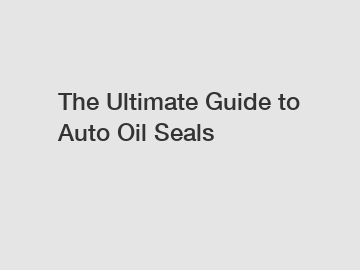The Ultimate Guide to Auto Oil Seals
The Ultimate Guide to Auto Oil Seals: What You Need to Know?
In the world of automotive maintenance, it's crucial to understand the importance of oil seals. These small but essential components play a vital role in preventing oil leaks and ensuring that your engine operates smoothly. Are you curious to know more about auto oil seals and their significance? Dive into this comprehensive guide, where we will cover everything you need to know about these often overlooked yet critical elements of your vehicle.
1. What are Auto Oil Seals?

Auto oil seals, also known as oil seals or shaft seals, are devices designed to prevent the leakage of lubricating oil from various engine parts. These seals are typically made of rubber or silicone and are positioned at different locations within the engine. Their purpose is to ensure that oil remains contained within the appropriate compartments, preventing leaks and minimizing friction.
2. Where are Auto Oil Seals found?
Auto oil seals can be found in several key locations within your vehicle's engine. Some common areas you will find these seals include the crankshaft, camshaft, valve stems, and the input and output shafts of the transmission. Each seal has a unique shape and size, specifically designed to fit its respective location and create an effective barrier against oil leakage.
3. The Importance of Auto Oil Seals.
Auto oil seals play a crucial role in maintaining the proper functioning of your vehicle's engine. Here's why they are so important:
a) Preventing Oil Leaks: Perhaps the most significant function of auto oil seals is to prevent oil leaks. Any leaks can lead to a loss of lubrication in critical engine components, resulting in increased wear and tear, reduced efficiency, and potential engine damage. By containing the oil within the intended areas, these seals help to preserve the optimal performance and longevity of your engine.
b) Minimizing Friction: Friction is one of the primary causes of wear and tear in an engine. Oil seals create a barrier between moving parts, such as the crankshaft and camshaft, ensuring they stay lubricated and reducing friction. By minimizing friction, oil seals contribute to a smoother and more efficient engine operation, enhancing overall performance and fuel efficiency.
c) Shielding against Contaminants: Auto oil seals not only keep the oil in but also keep harmful contaminants out. Dust, debris, and other particles can compromise the quality and effectiveness of the oil. Oil seals act as a protective barrier, preventing external elements from entering the engine and maintaining the purity of the lubricating oil.
4. Signs of Failing Auto Oil Seals.
Over time, auto oil seals may wear out or become damaged, compromising their effectiveness. Here are some common signs indicating a potential issue with these seals:
a) Oil Leaks: One of the most apparent signs of a failing oil seal is oil leakage. If you notice oil puddles or stains underneath your vehicle, it is crucial to address the issue promptly, as it can lead to significant engine damage if left unattended.
b) Increased Oil Consumption: If you find that your vehicle is consuming oil at a higher rate than usual, it could be an indication of a leaking oil seal. Keep an eye on your oil levels and consult a professional if you notice a significant increase in oil consumption.
c) Engine Overheating: Failing oil seals can disrupt the lubrication process, leading to increased friction and subsequent engine overheating. If you notice your engine temperature consistently rising, it's essential to have your oil seals inspected.
d) Unusual Engine Noises: When oil seals fail, the lack of proper lubrication can cause metal-on-metal contact, resulting in strange noises, such as knocking or grinding sounds. Any abnormal engine noise should be investigated promptly to prevent further damage.
5. Maintenance and Replacement.
To ensure the longevity and effectiveness of your auto oil seals, regular maintenance is crucial. Here are some tips to keep in mind:
a) Change oil regularly: Clean oil reduces the risk of contaminating the seals and prolongs their lifespan. Follow the manufacturer's recommended oil change intervals and use high-quality lubricants.
b) Inspect for leaks: Regularly check underneath your vehicle for any signs of oil leaks. If identified, address the issue promptly to prevent further damage.
c) Consult a professional: If you notice any signs of failing oil seals or suspect an issue, it's always best to seek the expertise of a professional mechanic. They can conduct a thorough inspection and replace any damaged seals if necessary.
In conclusion, understanding the importance of auto oil seals is crucial for maintaining the optimal performance and longevity of your vehicle's engine. By preventing oil leaks, minimizing friction, and shielding against contaminants, these small components play a significant role in keeping your engine running smoothly. Regular maintenance and prompt replacement when needed will ensure that your auto oil seals continue to fulfill their vital function, safeguarding your engine and enhancing your overall driving experience. So remember, when it comes to maintaining the health of your vehicle, never underestimate the power of well-functioning auto oil seals.
If you want to learn more, please visit our website china agricutural machinery seal supplier, new holland front axle oil, automobile motorcycle oil seal factory.

Comments